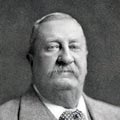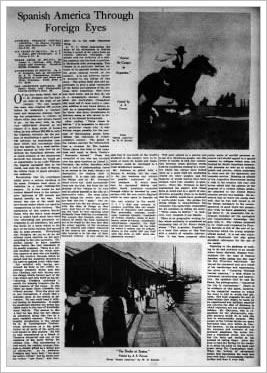A Tropical Island, Part 2
Juan Fernandez came to be so well favoured with fruits of all sorts, through a regulation that was in force many, many years ago. This enjoined that every warship that visited the island to replenish its stores, should leave some acknowledgment in the shape of a sow in farrow, a goat in kid, a she ass in foal, some poultry, and so on. The skipper was also supposed to have some fruit trees planted for the benefit of wayfarers in general. This instruction was very well observed, hence the quantities of peach trees, cherry trees, quinces, and so forth, one meets with on Juan Fernandez nowadays.
When I was there, wild horses were pretty plentiful. They were of a quality that rather surprised me, until I came to know many of them were sired by a magnificent specimen of the pure Koklani strain. This beautiful creature was twenty-two years old, yet seemed full of vigour. He much reminded me of my grandfather’s dear old Saladin, the pride of Porthgwydden. Both were lovely specimens of the pure white Arab.
These animals all belonged to the Government of Chile, likewise the wild asses and cattle. Anyone who cared to pay the Governor of the island £2 a head, could take his pick of the horses. Donkeys were so plentiful that every resident was permitted to have one gratis. I took advantage of this privilege and had two, one for myself and one for Fisher. I also invested in six horses. Three I left on the island, the other trio I shipped to the mainland on the Adriatico. Their fate I have already recorded.
The Governor of Juan Fernandez at the time was Alfred von de Rodht, an Austrian of Swiss extraction. Von de Rodht was a charming fellow, a man of noble presence, and clever withal. He was great at languages, but his pet hobby was geology. In the Franco-Prussian War, De Rodht was wounded in the knee, so at the cessation of hostilities his father sent him over to Valparaiso to recuperate. Six weeks was supposed to be the extent of his tether, but Baron Alfred seemed inclined to extend it indefinitely, hence his father wrote to a friend, and inquired what was detaining his son. Then the fat was in the fire. It appears De Rodht had fallen head over heels in love with a very beautiful woman, who was noted as an exponent of the Quaker dance. Unfortunately she was a married woman, and the husband, a Chilian sergeant-major, was in hospital with an injured leg. Directly old von de Rodht learnt how the land lay, he ordered Baron Alfred to return home at once. The parental summons being disregarded, he next called a meeting of the Rodht family at which Count Alfred was solemnly disinherited, and his brother Charles chosen to fill his place.
Alfred thus lost his patrimony, but he received £16,000 cash, and an annuity of £200. With the cash he rented the three islands from Chile, i.e. Juan Fernandez, Santa Clara, and Mas-a-fuera, bought three decent sized ships, and engaged a hundred peons. When his father’s agents learnt what he had done, they told him he had acted foolishly, and that it would cost a lot of money to feed a hundred men. They offered him 8 per cent. interest on his capital, and suggested he should be content to farm the islands. A staff of four to six men on each, they deemed sufficient for that purpose.
Count Alfred disregarded their advice, and so far from drawing in his horns, added to his entourage, until he had altogether 118 men working for him. In the upshot he went broke. So the Government stepped in and commandeered some of his cattle for arrears of rent. Finally they made him Governor of the islands, at a salary of £50 per annum, plus £40 for acting as Postmaster-General. With this addition to his annuity, Count Alfred managed to knock along all right. He was offered several tempting jobs from time to time—one at Valparaiso carried with it a screw of £40 a month—but he refused to entertain any of them. “Why should I go to the mainland,” he said, “where everything is comparatively dear, when I can live in the lazy man’s paradise for next to nothing, and do just as I please?”

